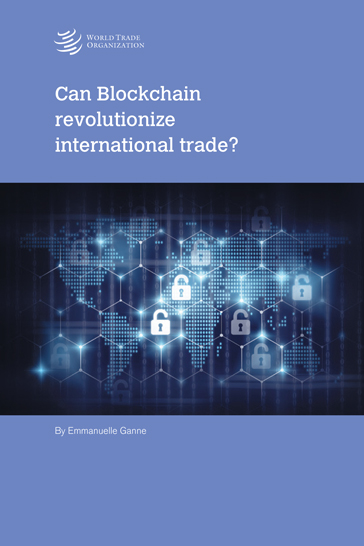RESEARCH WORKSHOP ON BLOCKCHAIN
Blockchain and International Trade: Opportunities, Challenges, and Implications for International Trade Cooperation
Blockchain and distributed ledger technology (DLT)(1) could have a wide-ranging impact on international trade. The specific features of the technology have the potential to enhance transparency and traceability, and to improve the efficiency of many processes related to international trade, from trade finance, to border procedures, and transportation and logistics. However, fulfilling this potential will require addressing various technical and regulatory challenges and creating a regulatory environment conducive to the deployment of the technology while mitigating the risks that may arise.
The workshop aims to initiate a discussion at the WTO on the practical and legal implications of blockchain for international trade. The workshop will present various use cases related to international trade, discuss the potential and the limitations of the technology for international trade, and start a reflection on the potential role of the WTO.
A new WTO publication authored by Emmanuelle Ganne entitled "Can Blockchain Revolutionize International Trade?" will be launched on the occasion of the workshop.
10.00 - 10:30 - Opening session
Opening address and launch of new WTO publication
Chair: Mr. Robert Koopman, Chief Economist, WTO
Opening remarks by Director-General Roberto Azevêdo
Audio
Launch of the WTO publication "Can Blockchain Revolutionize International Trade?" by Emmanuelle Ganne, Senior Analyst, WTO
Audio
Presentation
10:30-10:45 - Session 1
Blockchain 101
This session will present the main characteristics of Blockchain.
Moderator: Ms. Emmanuelle Ganne, Senior Analyst, WTO
Speaker:
- Mr. Enrico Camerinelli, Senior Analyst at Aite Group
Presentation
10:45-13:00 - Session 2
Blockchain and international trade: Selected use cases
This session will showcase how Blockchain can be used to enhance the efficiency of certain processes related to international trade, with a particular focus on trade finance, transportation and logistics, and border procedures. It will discuss how Blockchain could facilitate international trade.
Moderator: Ms. Emmanuelle Ganne, Senior Analyst, WTO
Trade finance
10:45-11:30 - Session 2A
Speaker:
- Mr. Enrico Camerinelli, Senior Analyst at Aite Group
Presentation - Ms. Michelle Chivunga Nsanzumuco, Chair, International Committee, British Blockchain Association
- Ms. Agnès Hugot, CEO, FastTrackTrade
Presentation - Mr. Marc Vandermolen, Expert Transactional Finance & Innovation Manager, KBC
Presentation
Transportation & logistics
11:30-12:10 - Session 2B
Speaker:
- Mr. Nico De Cauwer, Senior Business Analyst, Antwerp Port Authority
Presentation - Mr. Thierry Grumiaux, Délégué commission de transport, international et douane, FNTR
Presentation - Mr. Allan Jorgensen, Lead Sustainability Adviser, Maersk Shipping
Presentation
Border procedures and enforcement
12:10-13:00 - Session 2C
Speaker:
- Mr. Steve Capell, Enterprise Architect, Australian Government Department of Home Affairs – via video conference
Presentation - Mr. Luc De Blieck, Deputy Director, WCO
Presentation - Mr. Prasanna Lal Das, Lead Knowledge Management Officer, World Bank – via video conference
Presentation - Mr. Zahouani Saadaoui, Head of sector, DG TAXUD, European Commission
Presentation - Ms Choo Wai Yee, Deputy Director, Networked Trade Platform Office (NTPO), Singapore Customs – via video conference
13:00-15:00 - Lunch break
15:00-15:45 - Session 3
Blockchain and international trade: Opportunities and challenges
This session will briefly review the opportunities that blockchain could open and discuss the technical and regulatory challenges that the use of the technology raises.
Moderator: Emmanuelle Ganne, Senior Analyst, WTO
Speaker:
- Mr. Touradj Ebrahimi, Swiss national expert to ISO/TC 307, Professor at EPFL, Director of Auditchain
Presentation - Mr. Philippe Heeren, Lawyer, Deloitte Legal
- Mr. Lance Thompson, Secretary, UN/CEFACT - UNECE
Presentation
15:45-17:30 - Session 4
What role for the WTO?
This session will discuss the potential implications of blockchain for international trade cooperation and the role that the international community could play, in particular the WTO. After a quick tour de table, the floor will be open to all participants in the workshop for an interactive discussion.
Moderator: Emmanuelle Ganne, Senior Analyst, WTO
Roundtable:
- Mr. Steve Capell, Enterprise Architect, Australian Government Department of Home Affairs – via video conference
- Ms. Michelle Chivunga Nsanzumuco, Chair, International Committee, British Blockchain Association
- Mr. Luc De Blieck, Deputy Director, WCO
- Mr. Touradj Ebrahimi, Swiss national expert to ISO/TC 307, Professor at EPFL, Director of Auditchain
- Mr. Thierry Grumiaux, Délégué commission de transport international et douane, FNTR
- Mr. Philippe Heeren, Lawyer, Deloitte Legal
- Mr. Zahouahi Saadaoui, Head of sector, DG TAXUD, European Commission
- Mr. Lance Thompson, Secretary, UN/CEFACT - UNECE
- Ms. Nadia Webster, Principal Advisor, Service Innovation LabPlus, Department of Internal Affairs, Government of New Zealand – via video conference
Discussion
Audio17:30-18:00
Closing remarks
Chair: Deputy-Director General Xiaozhun Yi
Speaking points
Keynotes:
- Excmo. Sr. Roberto Zapata, Ambassador of Mexico to the WTO
- Mr. Abdelsalam Mohamed Al Ali, Director, Office of the UAE to the WTO
Closing Remarks
Footnotes
- Blockchain is one type of distributed ledger technology (DLT). However, the term is now commonly used to refer to DLT in general. A Blockchain is a decentralized, distributed record of transactions (ledger) in which transactions are stored in a permanent and near inalterable way using cryptographic techniques. Unlike traditional databases that are administered by a central entity, most blockchains rely on a peer-to-peer network that no single party can control. Back to text
Share
Problems viewing this page? If so, please contact [email protected] giving details of the operating system and web browser you are using.
